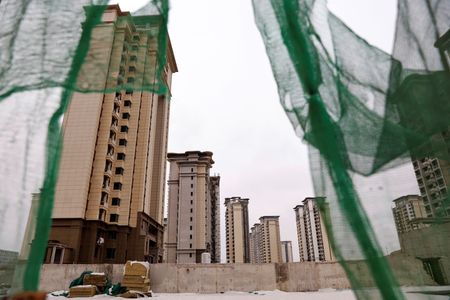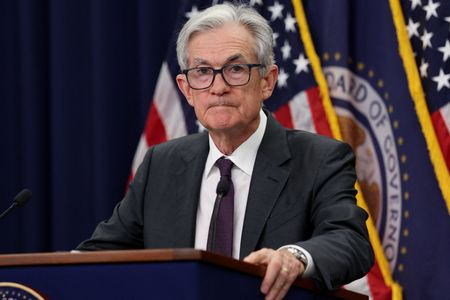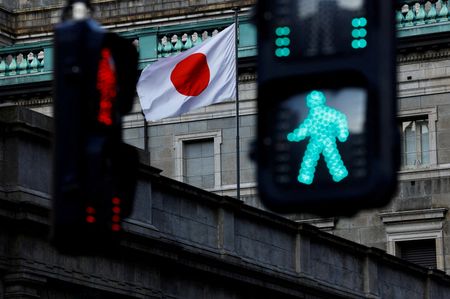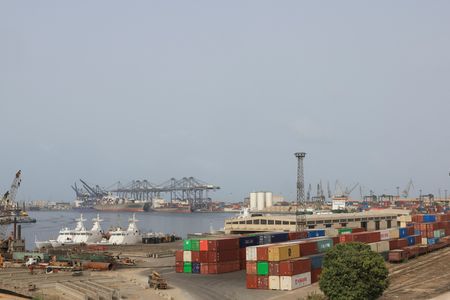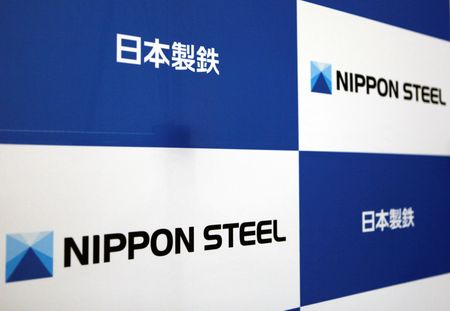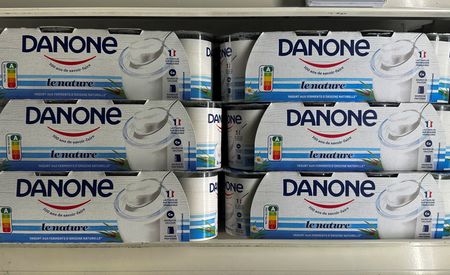By Clare Jim
HONG KONG (Reuters) -China Evergrande Group looks set to be kicked off the Hong Kong exchange next month after failing to revamp its debt and being pushed into liquidation, with the stubbornly weak Chinese property sector clouding the outlook for debt restructuring by its peers.
China’s property market, once a key growth driver for the world’s second-largest economy, has been in a multi-year tailspin despite repeated government attempts to revive weak consumer demand.
Developers face deteriorating cash flow but their bondholders are resisting taking heftier losses on their investments, delaying negotiations between companies and creditors, said restructuring advisers.
Shares of Evergrande, once China’s top developer which was listed in Hong Kong in 2009, have been suspended from trading since Jan. 29, 2024, the day it received a liquidation order from the Hong Kong High Court.
The liquidation order came after it failed to provide a viable restructuring plan for its $23 billion offshore debt.
The company appears set to be delisted from the Hong Kong bourse as a result of its failure to meet the exchange’s rules on resumption of trading within 18 months of the commencement of trading suspension.
Its capitalisation, which once topped HK$400 billion ($51 billion), had shrunk to HK$2.2 billion when share trading was halted.
The delisting of what had been one of China’s prestige companies would add to gloom hanging over other developers which are scrambling to stay afloat and avoid getting into liquidation litigation by securing creditors’ support to revamp debt.
Evergrande is not listed on mainland Chinese stock markets.
With Chinese new home prices falling at the fastest pace in 8 months in June, even developers who have completed first round debt revamps are weighing fresh negotiations and those that have not defaulted are also contemplating such a move to slash debt, financial advisers said.
“There’s no light at the end of the tunnel,” said Glen Ho, national turnaround & restructuring leader at Deloitte, referring to the property market.
“Companies want to delay their restructuring effective date and use time to exchange for more breathing room, but they cannot create new funds out of nothing.”
More than $140 billion, or more than 70%, of China property dollar bonds have defaulted since 2021, according to investment platform FSMOne Hong Kong, and the majority of them are still in various stages of being restructured.
FUNDING CHANNELS
Property construction in China is expected to decline another 30% by 2035 due to structural changes in demand, ANZ analysts said in a June report, which could cast a long shadow over debt restructuring efforts in the near to medium term.
Private developer Country Garden, which defaulted on $14 billion offshore debt in 2023, is still trying to get its lenders’ approval on its debt restructuring proposal before the next liquidation hearing on August 11.
Other developers including KWG and Agile have yet to announce detailed restructuring proposals after having started the process in 2023 and 2024, respectively, soon after defaulting on their repayment obligations.
Logan and Powerlong, on the other hand, have cut their offers to bondholders more than once, but have yet to secure approval from their creditors, said two people with knowledge of the matter said.
The people declined to be identified as they were not authorised to speak to the media.
Evergrande’s liquidators, Country Garden and HKEX declined to comment. KWG, Agile, Logan and Powerlong did not respond to requests for comment.
Advisers expect some developers, especially privately-owned ones, to go through more than one or even two rounds of debt revamp in the absence of an improvement in home sales outside China’s top cities and the availability of funding channels.
‘CONTINUOUS DELEVERAGING’
China’s property sector accounted for about a quarter of the country’s economic activity before it collapsed.
But despite repeated attempts by authorities to stabilise the market, property investment in China declined 11.2% in the first half of this year from a year earlier, while property sales by floor area fell 3.5% and new construction starts dropped 20%.
This year, Shimao and state-backed Sino-Ocean were among the latest to set a date for implementing restructurings after years of wrangling with creditors, according to their regulatory filings.
Sunac became the first developer earlier this year to propose a second restructuring to swap all its restructured notes into mandatory convertible bonds and has gained sufficient creditors approval.
Zhongliang also successfully extended the maturity of all its restructured bonds by two years.
Kaisa’s restructuring plan, already approved by creditors and courts, however, has not yet gained the greenlight from China’s top economic planner, as the plan involves new debt, two other people said.
Kaisa and NDRC did not respond to request for comment.
“There’s no one single playbook; each restructuring plan must be tailored to a company’s unique capital and creditor structure,” said Una Ge, a Hong Kong-based partner at consultancy firm AlixPartners.
“For privately-owned developers, however, the clear trend is a need for continuous deleveraging, as a single round of restructuring is often insufficient to keep them afloat.”
($1 = 7.8499 Hong Kong dollars)
($1 = 7.1793 Chinese yuan renminbi)
(Reporting by Clare Jim; Editing by Sumeet Chatterjee and Kim Coghill)

